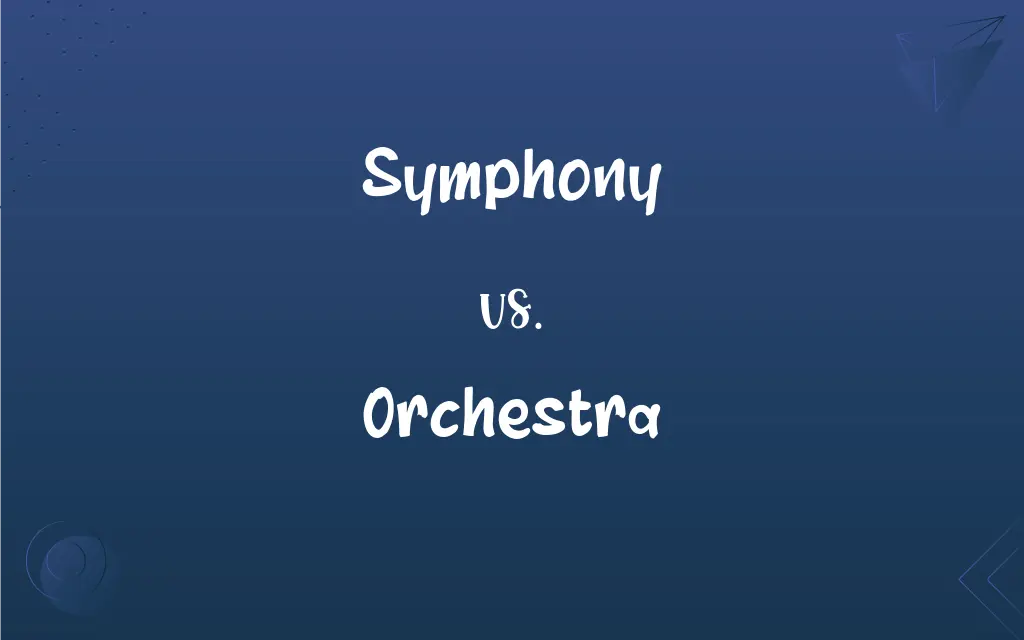Symphony vs. Orchestra: What's the Difference?
Edited by Aimie Carlson || By Janet White || Published on November 12, 2023
A symphony is an extended musical composition, while an orchestra is a large ensemble of musicians playing various instruments.

Key Differences
A symphony and an orchestra are both terms associated with classical music, but they refer to different concepts within this realm. A symphony is a type of extended musical composition, typically written for an orchestra to play. Comprising multiple movements, it blends various musical themes and moods to create a cohesive auditory experience. An orchestra, however, is the group of musicians who perform these compositions. It's the ensemble consisting of various instrument sections, such as strings, brass, woodwinds, and percussion.
When we talk about a symphony, we delve into the realm of compositions. These works, which can span anywhere from 20 minutes to more than an hour, showcase the composer's artistic expression. Renowned composers like Beethoven, Mozart, and Tchaikovsky have given us iconic symphonies that have stood the test of time. Conversely, the orchestra is all about the performers. This group of musicians, under the guidance of a conductor, brings the symphony to life, ensuring every note, crescendo, and nuance is captured.
The symphony's beauty lies in its structure and evolution. Starting from a certain theme or mood, it progresses through various movements, each having its distinct character, but all connected in essence. The orchestra's role is crucial in this journey, as it interprets and presents the symphony, making choices on dynamics, tempo, and expression based on the conductor's vision and the composer's intent.
In conclusion, while both symphony and orchestra are integral to the world of classical music, they serve different functions. The symphony is the artistic creation, the piece of music to be played, and the orchestra is the collective of musicians that brings that creation to auditory life.
Comparison Chart
Nature
Composition
Group of musicians
ADVERTISEMENT
Elements
Movements, themes
Instrument sections (e.g., strings, brass)
Duration
Varies (often 20 minutes to over an hour)
N/A (as it's not a composition)
Creators
Composers (e.g., Beethoven, Mozart)
Musicians led by a conductor
Function
Artistic expression in musical form
Perform musical compositions, including symphonies
Symphony and Orchestra Definitions
Symphony
A lengthy composition with multiple contrasting sections.
The composer's new symphony was received with standing ovations.
ADVERTISEMENT
Orchestra
A large ensemble of musicians playing varied instruments.
The orchestra delivered a captivating performance last night.
Symphony
A work that showcases a composer's musical narrative.
The symphony portrayed the journey of life with its ups and downs.
Orchestra
The collective body that brings classical compositions to life.
The orchestra's rendition of the overture was truly mesmerizing.
Symphony
An extended musical work for orchestra.
Beethoven's Ninth Symphony is hailed as a masterpiece.
Orchestra
A group that performs symphonies and other compositions.
The city's renowned orchestra will tour Europe next year.
Symphony
A harmonious combination of elements.
The event was a symphony of colors, sounds, and emotions.
Orchestra
Musicians led by a conductor to interpret compositions.
Under the new conductor, the orchestra explored contemporary pieces.
Symphony
A musical form that evolves through different movements.
The symphony began with a somber adagio, transitioning into a lively allegro.
Orchestra
A large group of musicians who play together on various instruments, usually including strings, woodwinds, brass instruments, and percussion instruments.
Symphony
An extended piece in three or more movements for symphony orchestra.
Orchestra
The instruments played by such a group.
Symphony
An instrumental passage in a vocal or choral composition.
Orchestra
The area in a theater or concert hall where the musicians sit, immediately in front of and below the stage.
Symphony
An instrumental overture or interlude, as in early opera.
Orchestra
The front section of seats nearest the stage in a theater.
Symphony
A symphony orchestra.
Orchestra
The entire main floor of a theater.
Symphony
An orchestral concert.
Orchestra
A semicircular space in front of the stage used by the chorus in ancient Greek theaters.
Symphony
Harmony, especially of sound or color.
Orchestra
(music) A large group of musicians who play together on various instruments, usually including some from strings, woodwind, brass and/or percussion; the instruments played by such a group.
Symphony
Something characterized by a harmonious combination of elements.
Orchestra
A semicircular space in front of the stage used by the chorus in Ancient Greek and Hellenistic theatres.
Symphony
An extended piece of music of sophisticated structure, usually for orchestra.
Orchestra
The area in a theatre or concert hall where the musicians sit, immediately in front of and below the stage, sometimes (also) used by other performers.
Symphony
(music) An instrumental introduction or termination to a vocal composition.
Orchestra
The space in a theater between the stage and the audience; - originally appropriated by the Greeks to the chorus and its evolutions, afterward by the Romans to persons of distinction, and by the moderns to a band of instrumental musicians. Now commonly called orchestra pit, to distinguish it from the section of the main floor occupied by spectators.
Symphony
Harmony in music or colour, or a harmonious combination of elements.
Orchestra
The space in the main floor of a theater in which the audience sits; also, the forward spectator section of the main floor, in distinction from the parterre, which is the rear section of the main floor.
Symphony
A symphony orchestra.
Orchestra
The place in any public hall appropriated to a band of instrumental musicians.
Symphony
A consonance or harmony of sounds, agreeable to the ear, whether the sounds are vocal or instrumental, or both.
The trumpets sound,And warlike symphony in heard around.
Orchestra
Loosely: A band of instrumental musicians performing in a theater, concert hall, or other place of public amusement.
Symphony
A stringed instrument formerly in use, somewhat resembling the virginal.
With harp and pipe and symphony.
Orchestra
The instruments employed by a full band, collectively; as, an orchestra of forty stringed instruments, with proper complement of wind instruments.
Symphony
An elaborate instrumental composition for a full orchestra, consisting usually, like the sonata, of three or four contrasted yet inwardly related movements, as the allegro, the adagio, the minuet and trio, or scherzo, and the finale in quick time. The term has recently been applied to large orchestral works in freer form, with arguments or programmes to explain their meaning, such as the "symphonic poems" of Liszt. The term was formerly applied to any composition for an orchestra, as overtures, etc., and still earlier, to certain compositions partly vocal, partly instrumental.
Orchestra
A musical organization consisting of a group of instrumentalists including string players
Symphony
A long and complex sonata for symphony orchestra
Orchestra
Seating on the main floor in a theater
Symphony
A large orchestra; can perform symphonies;
We heard the Vienna symphony
Orchestra
An ensemble comprising strings, brass, woodwinds, and percussion sections.
The orchestra's string section was particularly impressive.
FAQs
How long does a typical symphony last?
Symphonies vary in length, but many last between 20 minutes and an hour or more.
Is every composition played by an orchestra called a symphony?
No, orchestras play various compositions, including concertos, overtures, and suites.
Who leads the orchestra during a symphony performance?
A conductor leads and guides the orchestra throughout the performance.
Can one orchestra perform multiple symphonies?
Yes, orchestras can play a vast repertoire, including numerous symphonies.
Can an orchestra play genres other than classical?
Yes, some orchestras perform jazz, film scores, and other genres.
Can a symphony be played by a small group?
Typically, symphonies are for orchestras, but chamber versions or adaptations can exist for smaller ensembles.
Are there modern symphonies, or are they all historic?
While many famous symphonies are historic, composers continue to write symphonies today.
Are all symphonies named with numbers?
Many are (e.g., Beethoven's Fifth), but symphonies can also have descriptive titles.
How many movements does a standard symphony have?
A standard symphony often has four movements, but this can vary.
Do all members of an orchestra play throughout a symphony?
Not necessarily. Parts of a symphony might feature specific instrument sections or soloists.
Is a philharmonic different from an orchestra?
"Philharmonic" often refers to specific orchestras or societies, but functionally, a philharmonic is an orchestra.
How many musicians typically comprise an orchestra?
This varies, but a full symphony orchestra might have 70 to 100 or more musicians.
How is a symphony's theme established?
Often, the theme is introduced in the opening movement and is explored and varied throughout the symphony.
What's the difference between a chamber orchestra and a symphony orchestra?
A chamber orchestra is smaller, typically performing pieces suited for fewer musicians.
Is a concerto a type of symphony?
No, a concerto typically spotlights a soloist with orchestra accompaniment, while a symphony focuses on the entire ensemble.
Do orchestras have permanent members?
Many professional orchestras have permanent members, but they may also hire additional musicians for specific pieces.
Are members of an orchestra specialized in certain compositions?
Orchestra members specialize in their instruments but are versatile in playing various compositions and styles.
Can a symphony be written for instruments other than orchestra?
While traditionally for orchestras, some modern symphonies might incorporate non-traditional instruments or electronic sounds.
Can you have a symphony without an orchestra?
While symphonies are written for orchestras, adaptations exist for smaller groups or even solo instruments.
Do orchestras only play in concert halls?
While many perform in concert halls, orchestras also play in outdoor venues, theaters, and other spaces.
About Author
Written by
Janet WhiteJanet White has been an esteemed writer and blogger for Difference Wiki. Holding a Master's degree in Science and Medical Journalism from the prestigious Boston University, she has consistently demonstrated her expertise and passion for her field. When she's not immersed in her work, Janet relishes her time exercising, delving into a good book, and cherishing moments with friends and family.
Edited by
Aimie CarlsonAimie Carlson, holding a master's degree in English literature, is a fervent English language enthusiast. She lends her writing talents to Difference Wiki, a prominent website that specializes in comparisons, offering readers insightful analyses that both captivate and inform.







































































